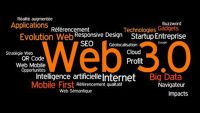To say the internet is in a state of flux is an understatement. The internet is always changing, evolving and adjusting. And one of the changes that we could start to see in the next few years is the development of the semantic web.
But what is the semantic web? Why is it useful? And what purpose does it serve?
Understanding the Semantic Web
Before we go too deep into the semantic web, let us break down what it means. The word semantic implies that it has something to do with language. After all, semantics is the concept of properly arranging variables such as letters, numbers, symbols and spaces so words and phrases can be understood.
The same concept is true of the semantic web. It is about arranging information that is located online so that it can be easily understood. But the key aspect to the semantic web is that information should be organized so that it is better understood by machines!
 Machine Learning
Machine Learning
People are already able to understand information online. Whether you are searching for a recipe, the price of a book or the latest television show episode, information is laid out in a way that you would understand. It is laid out so that you can understand and interpret that information to your liking.
But the problem is that our way of arranging this information online, which is done through HTML and other computer languages, is not applicable to machines. The machines are not able to understand or interpret enough of this information accurately enough or quickly enough.
The semantic web is the idea that machines should be able to do what we are doing today. That machines should be able to seek out and understand the information that is listed online.
Everyone Benefits
The idea of a machine being able to “go online” and seek out information, understand it and then interpret it is scary. But the truth is that everyone would benefit. Not only would machines have an easier time understanding and interpreting the information, but they would also be able to determine if it is accurate. They would be able to distinguish between random information and details that come from a proper source. And that would lead to a lot less misleading and downright false information that we find online today.
Major Organizations Benefit Too
There is so much information on the web. Being able to quickly search through that information for specific details is a hard job. While there are search engines and other tools that can serve this purpose, they are still not perfect.
Having the semantic web in place would mean that sifting through data would be even faster and more accurate than it is right now. Such a concept would be useful for big companies, educational institutes, medical facilities, law offices and more!
Adding Meaning to Data
The problem is that right now machines are able to sift through data based on parameters we set. However, machines are not sure what the data means. There is a huge difference between a machine looking up a phrase and regurgitating the first result, compared to the machine understanding the query and the resulting information that it is receiving.
And with online assistants, AI and other tech on the rise, it will be interesting to see how the semantic web plays into everything. Even future tech such as driverless cars, which may become mainstream in a decade, will be linked to the semantic web. It is all about leveraging the power of machines and the vast information that is available online, so that machines are able to interpret that information in a more accurate and productive way.






